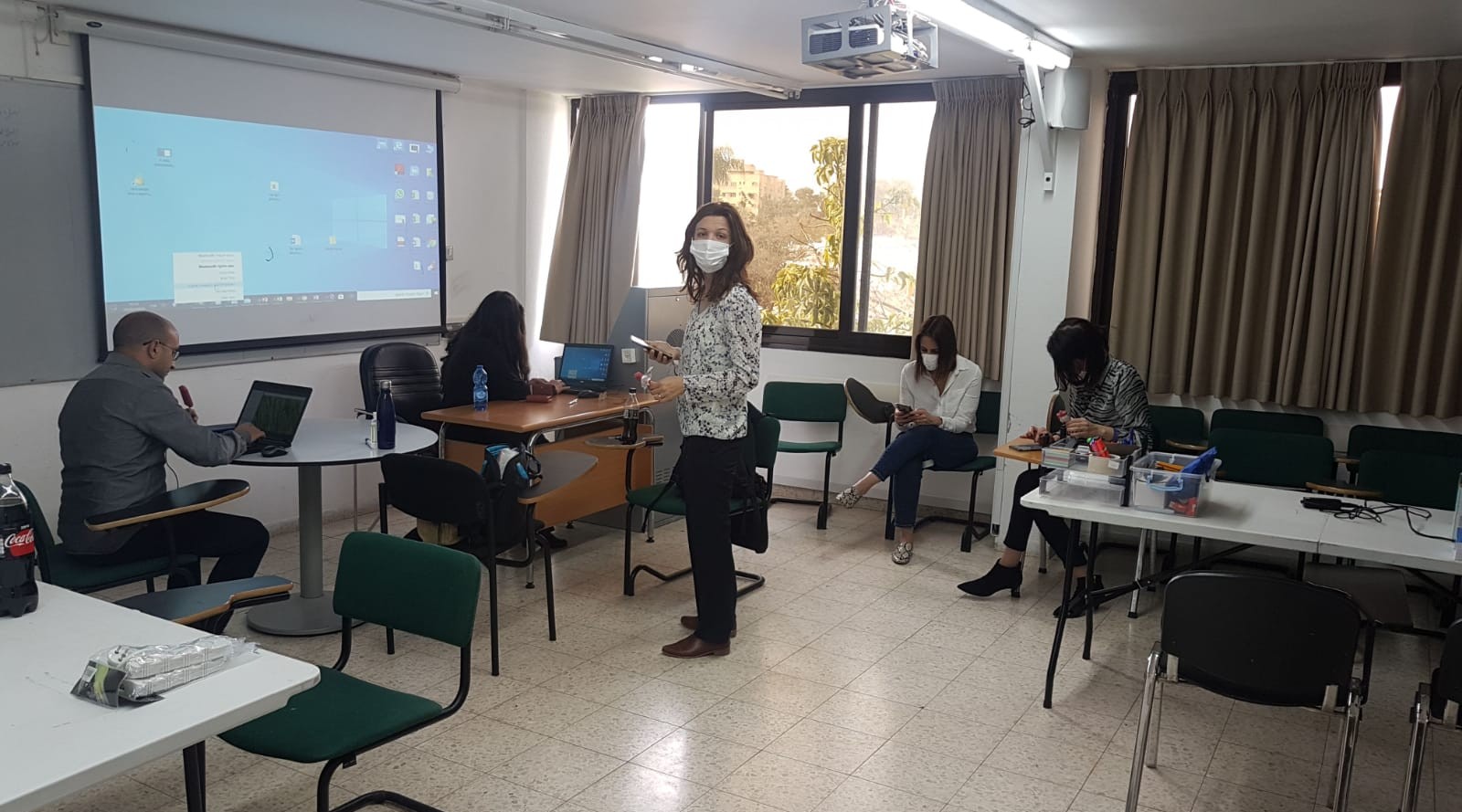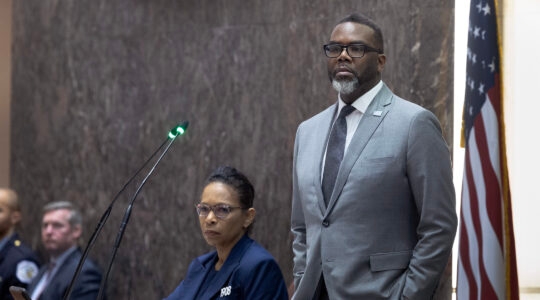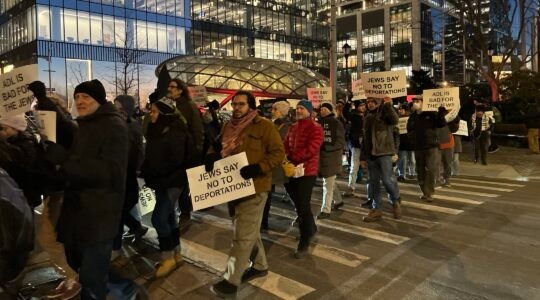Some 200 Israeli foster children with emotional and physical needs are riding out the coronavirus pandemic at the Ahava Children and Youth Village in Kiryat Bialik, a suburb of Haifa.
In the nearby Galilee village of Majd al-Kurum, the Arab-Jewish tech incubator Moona is developing a prototype so that hundreds of small-scale manufacturers can produce the nanofibrous porous mesh crucial to N95 surgical masks.
And in Ethiopia, about 8,000 people waiting to immigrate to Israel are getting emergency food packages and extra soap to halt the spread of COVID-19.
All three projects are being supported with grants from the San Francisco-based Jewish Community Federation and Endowment Fund, which has earmarked $804,000 for grants to Israel from over $13 million in total allocated so far for coronavirus response.
Federation funding of overseas projects is continuing even as many of America’s 7 million or so Jews struggle with job losses, new financial pressures and social isolation brought on by the nation’s worst health crisis in a century.
“Our donors not only have local connections and values, but they’re also global citizens who are thinking about needs in Israel,” said Sindy Craig, senior director of gift planning and endowments at the federation.
Many of the funds that provided coronavirus-related grants came from endowment funds that were established through donors’ estate gifts decades ago.
“If a donor tells us their fund is for a particular need in Israel, we have a legal responsibility to honor those restrictions, and it’s our honor to carry out their legacy in this way,” Craig said.
That money has never been needed more, said Rebecca Caspi of the Jewish Federations of North America, the umbrella organization that represents 146 local Jewish federations in the United States and Canada.
“Right now, nonprofit groups in Israel are reeling from the combination of the coronavirus and uncertainty around government funding for the last year and a half,” said Caspi, who heads Jewish Federations’ Jerusalem office.
While Israel’s coronavirus death toll is relatively low and the country is now easing many of the lockdown restrictions put in place to arrest its spread, Israel is coming to terms with the full extent of its devastating economic impact. Unemployment now stands at 26%.
Among the projects that Jewish federations are collectively funding in Israel are a $125,000 grant to install WiFi in immigrant absorption centers and buy tablet computers for distance learning; a $90,000 grant to provide food baskets and essential hygiene needs for elderly Israelis confined to their apartments; and $75,000 for the Israel Trauma Coalition to establish a COVID-19 crisis hotline and train first-line responders and social workers.
At the Minneapolis Jewish Federation, 45% of annual allocations usually go overseas, according to marketing director Heather Villars. In April, the federation granted $180,000 each to the Jewish Agency for Israel and the JDC humanitarian organization for COVID-19 response programs in Israel and the former Soviet Union.
“Minneapolis has always cared about overseas Jewry,” Villars said. “We really believe all Jews are responsible for one another, in good times and bad.”
The Jewish Federation of Greater Philadelphia announced recently that it was releasing $2.5 million for organizations in Israel to help them deal with the coronavirus pandemic. That’s separate from the federation’s $1.3 million COVID-19 Emergency Response Fund, much of which will also go to Israeli charities.
For the UJA-Federation of New York, annual giving to Israel accounts for approximately 16% of total allocations, according to Deborah Joselow, the federation’s chief planning officer. Since the pandemic began, the federation has committed about $44 million in total, including $1.2 million for Israel.
“It’s a different health crisis in Israel than in New York, but our commitment to the people of Israel is a constant,” Joselow said.
That $1.2 million includes $600,000 for the Jewish Agency for two loan funds — for small businesses and for nonprofit organizations struggling due to the pandemic. In addition, the federation gave $250,000 to the Israeli nonprofit group Maoz for its Coronavirus Command Center.
“Our mission is to take leaders from the public and private sectors, train them in a one-year fellowship and build trust among them,” said Yoav Heller, CEO of Maoz. “When COVID-19 erupted, we decided to take this network of 600 leaders and connect them to one another to provide knowledge and resources where they were lacking.”
The $250,000 grant, Heller said, was “quick money for quick solutions.” As one example, he pointed to an initiative to help Israel’s haredi Orthodox and Arab communities understand the coronavirus threat and adopt social distancing.
“The rabbis didn’t understand the severity of the problem, and the Ministry of Health didn’t understand the nuances of the community,” Heller said. “We brought in three doctors and invited 36 Chabad rabbis to join a Zoom chat. They had a very deep conversation and asked lots of questions. We then produced a policy paper with five specific recommendations.”
Among other things, Maoz recorded robocalls of Yiddish-speaking rabbis imploring community members to wash their hands, wear masks and practice social distancing. Mayors of Arab towns and villages did likewise, speaking Arabic.
The Jewish Federation of Greater MetroWest, which serves five counties in northern New Jersey, allocated 44% of last year’s $24.4 million annual campaign to Israel and overseas causes.
“In addition to the needs of our local Jewish communities, our federation is also dedicated to our partnership communities in Israel, a shared Israeli society, underserved populations in Israel and supporting Arab-Israeli communities,” said Melanie Robbins, the federation’s director of global connections.
JTA has documented Jewish history in real-time for over a century. Keep our journalism strong by joining us in supporting independent, award-winning reporting.
This article was sponsored by and produced in partnership with the Jewish Federations of North America, which represents over 300 Jewish communities and distributes over $2 billion annually to build flourishing Jewish communities around the globe. This story was produced by JTA's native content team.
More from Jewish Federations of North America





